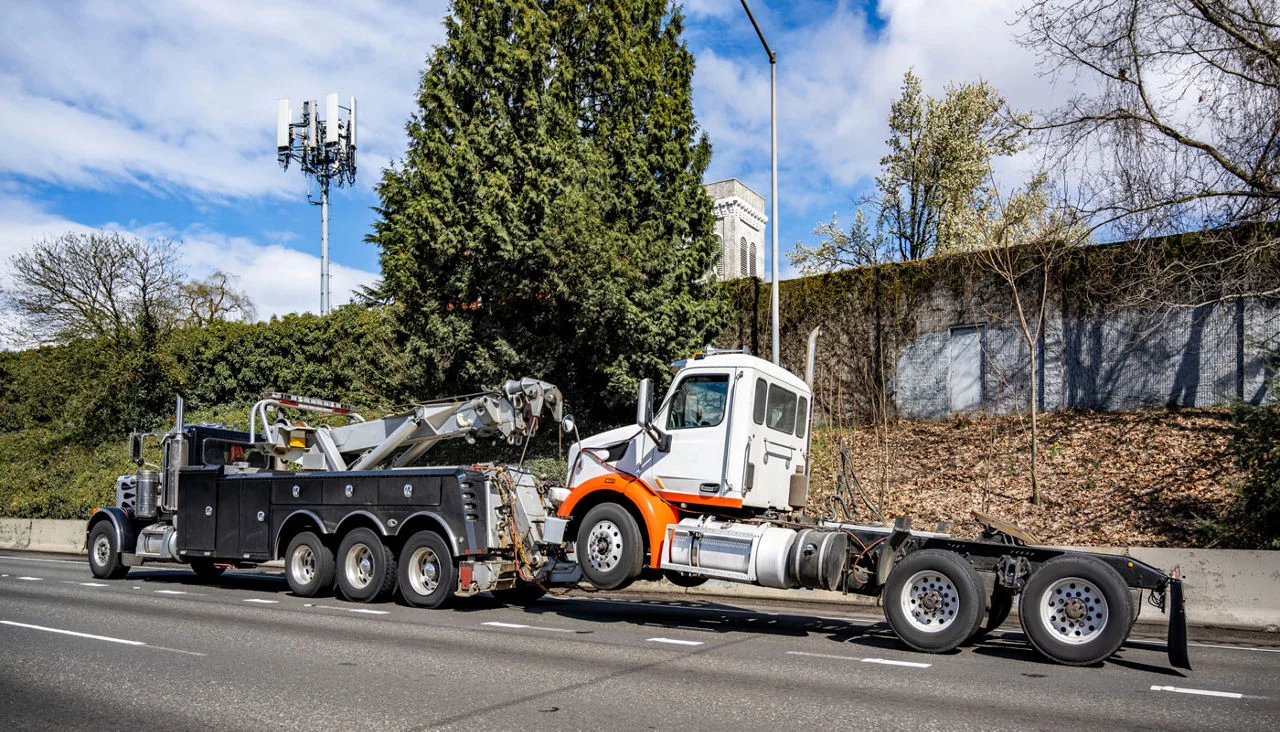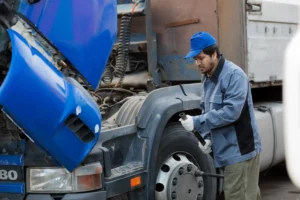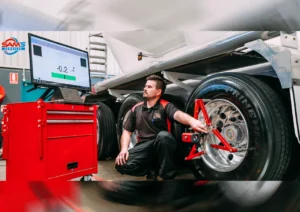
Knowing when to call a heavy duty tow truck can save you hours of downtime, thousands in repair costs, and reduce safety risks for you and other road users. Truck problems range from simple roadside fixes to catastrophic failures that require specialized recovery equipment. In this guide I’ll walk you through the most common scenarios that require heavy-duty intervention, what to do while you wait, and how a professional crew like Sam’s Services responds to each situation.
What exactly is a heavy duty tow truck? (and where to learn more)
A heavy duty tow truck is a purpose-built recovery vehicle equipped with high-capacity winches, hydraulic booms (often rotators), multi-axle chassis, and heavy underlift systems designed to move or upright vehicles weighing tens of thousands of pounds — like semis, motorcoaches, and heavy construction equipment. For a deep dive into the different types of tow trucks, how they work, and what makes them essential for commercial vehicle recovery, check out our Heavy-Duty Semi Truck Towing Services in Houston – Complete Guide. It covers everything you need to know about heavy-duty towing and how to choose the right solution for your rig.
1) Major mechanical failure — engine, transmission, or axles
If your truck develops catastrophic mechanical problems — a seized transmission, collapsed axle, or total engine failure — you’ll usually be unable to safely move under its own power. These are classic situations to call a heavy duty tow truck. Attempting to limp a disabled heavy vehicle can cause further internal damage or create a hazard on the road. Pull as far off the road as safely possible, engage your hazards, and contact a 24/7 heavy-duty provider for a controlled tow to a qualified shop.
(If the problem is a smaller battery or tire issue, our Roadside Service teams can often help without a tow.)
2) After an accident: rollovers, jackknifes, and severe collisions
Accidents are the most common reason drivers need heavy-duty recovery. Overturned trailers, jackknifed rigs, and serious collisions require equipment that can upright and secure the vehicle, manage load shifts, and prepare the truck for transport. A professional heavy duty crew will coordinate with law enforcement, deploy traffic control measures, and — when required — work with Hazmat specialists to contain spills. If cargo or fuel has leaked, our Hazmat Clean-Up team can be dispatched alongside the recovery unit to protect people and the environment.
When an accident blocks lanes, calling a heavy-duty wrecker quickly clears the scene, reducing secondary crashes and regulatory exposure.
3) Jackknifes, stuck rigs & ditch recoveries (winching required)
A truck stuck in a ditch or jackknifed into a median almost always needs a heavy duty tow truck with winching capacity. Winching a loaded trailer back onto pavement requires careful weight calculation, anchor placement, and often a second unit for counter-pull. These recoveries are complex: incorrect rigging can bend frames or make a reload impossible. That’s why heavy-duty recovery crews use engineered rigging and experienced operators to return rigs to a safe posture before towing to a service facility.
4) Overweight or overloaded vehicles and damaged trailers
If a trailer has suffered structural damage or you’re carrying an irregular/overweight load, a standard tow is not enough. Heavy-duty wreckers can support damaged suspensions and redistribute loads to prevent further collapse. If your trailer is seriously damaged, ask the recovery crew about on-site stabilization and temporary repairs — and consider scheduling a follow-up at our Trailer Repairs shop to avoid repeat incidents.
5) Off-road, remote, or hard-to-access recoveries
Construction sites, muddy fields, oilfield roads, and remote delivery points can trap heavy equipment in ways that light and medium tow trucks cannot handle. A heavy duty tow truck with off-road capability, traction assistance, and powerful winches is required to extract vehicles from these environments safely. When your route includes remote locations, ensure your recovery partner has the right fleet and experience — this prevents long, risky recovery attempts that can extend damage.
Roadside Support You Can Count On
No matter the situation, our reliable roadside assistance ensures you get the help you need, fast. From breakdowns to emergencies, we’re here 24/7 to keep you moving.
6) When safety or traffic exposure is high
If your disabled truck is sitting on a high-speed roadway, in a narrow shoulder, or creating a major hazard during peak traffic, call a heavy duty crew immediately. They bring traffic-control capability and equipment fast enough to remove the hazard. Our dispatchers routinely prioritize high-risk scenes and coordinate rapid lane clearance to protect drivers and reduce liability.
(For emergency, around-the-clock response see our cluster post: 24/7 Heavy Duty Towing Near Me – Fast & Reliable Houston Services.)
7) When on-site repairs aren’t possible or safe
Sometimes the initial call looks like a small fix, but on arrival our technicians find hidden issues — contaminated fuel, internal pump metal fragments, or failed injectors — that make driving unsafe. In those cases, the team will recommend a full tow. Rather than attempt temporary repairs that may fail in minutes, a heavy-duty tow to a shop prevents cascading damage. If your truck needs mobile diagnosis or shop-level work after the tow, we provide both mobile truck repair and in-shop services to get you moving again.
8) Planned heavy moves & equipment transport
Not every heavy-duty call is an emergency. Moving inoperable rigs, transporting damaged equipment between facilities, or relocating construction machinery often requires heavy-duty towing. Using professional heavy-duty services for planned moves ensures legal compliance, proper load securing, and safe transit — especially for long hauls.
(If you anticipate extended downtime, our Equipment Lease and Sale and repair resources can keep your operation running while repairs are completed.)
How to prepare while you wait for a heavy duty tow truck
Move to a safe location if possible; set up triangle reflectors and hazard lights.
Secure cargo and note load position — taking photos helps recovery crews understand load distribution.
Document the scene (photos, skid marks, fluid leaks) for insurance and repair planning.
Communicate clearly with dispatch about vehicle weight, cargo type, and any hazardous materials on board. This helps ensure the right equipment is dispatched.
Avoid DIY recovery attempts; untrained rigging risks additional damage and injury.
For safety best practices, see our related cluster piece: Top 10 Heavy Duty Towing Safety Tips Every Truck Driver Should Know.
How to choose a heavy duty tow partner in a hurry
When you need a heavy-duty tow fast, evaluate providers on three rapid criteria:
Fleet capability: Do they have rotators, integrated wreckers, and winching units?
Availability & response: Can they dispatch 24/7 with local coverage? (Check their 24/7 dispatch page.)
Coordination skills: Will they handle traffic control, coordinate with Hazmat, and liaise with law enforcement if needed?
For a full checklist on hiring the right provider, read: How to Choose the Right Heavy Duty Truck Towing Service in Houston. Transparent pricing is also critical — if cost is a concern, our cost breakdown explains what drives heavy-duty towing rates.
Closing — act fast, protect your rig and livelihood
A broken truck is more than an inconvenience — it’s a business disruption and a safety risk. Knowing when to call a heavy duty tow truck means protecting your equipment, cargo, and the people around you. If you’re in Houston and need immediate, professional recovery or towing, Sam’s Services offers experienced operators, modern heavy-duty equipment, and 24/7 dispatch to handle the full range of commercial vehicle incidents.
Need help now? Visit our Towing and Recovery page or Contact Us for immediate assistance.
FAQs – Heavy Duty Tow Truck Services in Houston
You should call a heavy duty tow truck when your semi-truck or commercial vehicle experiences severe mechanical failure, is involved in an accident, is stuck off-road, or needs recovery from a rollover. These specialized tow trucks are equipped to handle large, heavy vehicles safely and efficiently.
Yes, heavy duty tow trucks are designed to handle fully loaded tractor-trailers and other large commercial vehicles. With advanced winching systems and high-capacity booms, they can tow or recover vehicles with significant weight, even in challenging situations.
Heavy duty towing is specifically meant for large vehicles like semis, buses, construction equipment, and RVs, requiring specialized equipment and skilled operators. Standard towing, on the other hand, is suited for passenger cars, SUVs, and light trucks with far less weight and complexity.
Response times vary depending on your location and traffic conditions, but most heavy duty towing services in Houston aim to reach you within 30 to 60 minutes. For emergencies, calling a 24/7 towing company ensures the fastest possible dispatch.
Some heavy duty towing companies, like Sam’s Services, also offer roadside assistance for minor issues. However, if your truck needs major mechanical work, the tow truck will transport it to a repair facility safely.



